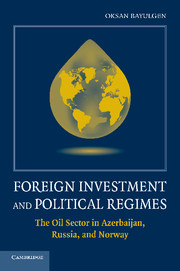Book contents
- Frontmatter
- Contents
- List of Figures and Tables
- Acknowledgments
- 1 Introduction
- 2 Political Risks in Oil Investments: A History of Antagonistic Interdependence Between Companies and Host-Governments
- 3 With or Without Democracy? The Political Economy of Foreign Direct Investments
- 4 Curse or Blessing? Effects of FDI on Development
- 5 Azerbaijan: One-Stop Shopping
- 6 Russia: Two Steps Forward, One Step Back
- 7 Norway: Icon of Stability
- 8 Beyond Three Cases and Oil
- 9 Conclusion
- References
- Index
4 - Curse or Blessing? Effects of FDI on Development
Published online by Cambridge University Press: 03 May 2010
- Frontmatter
- Contents
- List of Figures and Tables
- Acknowledgments
- 1 Introduction
- 2 Political Risks in Oil Investments: A History of Antagonistic Interdependence Between Companies and Host-Governments
- 3 With or Without Democracy? The Political Economy of Foreign Direct Investments
- 4 Curse or Blessing? Effects of FDI on Development
- 5 Azerbaijan: One-Stop Shopping
- 6 Russia: Two Steps Forward, One Step Back
- 7 Norway: Icon of Stability
- 8 Beyond Three Cases and Oil
- 9 Conclusion
- References
- Index
Summary
Foreign capital, once invested, can have significant effects on the economic and political development of a host country. Foreign Direct Investment (FDI) and its developmental effects have assumed greater importance in the context of increasing globalization and the likewise increasing discontent with it. There is a significant body of political economy literature that examines the impact of FDI on economic growth, distribution of wealth, governance, social wellbeing, and political structure. Even though determining the exact effects has proven to be remarkably contentious and complicated, one can generally discern two competing approaches. The first sees FDI as having direct and indirect positive effects on a host country economy and as promoting democracy. This neoliberal approach centers on the logic of modernization, which assumes an inherent link between increased economic interdependence, socio-economic development, and democracy. The second approach, influenced by dependency theories, focuses on the negative impacts of foreign capital as retarding economic development and producing significant social and political costs.
In between the benign and malign models of FDI, many studies have started to emphasize that the effects of FDI are neither uniform nor automatic. The UNCTAD World Investment Report (2007), for instance, finds that the direction and intensity of FDI's influence depend on the characteristics of the foreign companies that are involved, the form of their involvement, the international market conditions and commodity prices, among other things.
- Type
- Chapter
- Information
- Foreign Investment and Political RegimesThe Oil Sector in Azerbaijan, Russia, and Norway, pp. 72 - 86Publisher: Cambridge University PressPrint publication year: 2010



